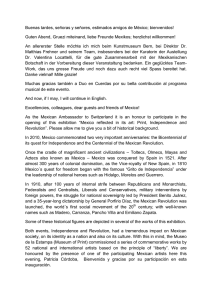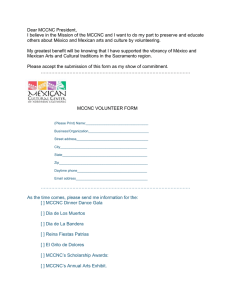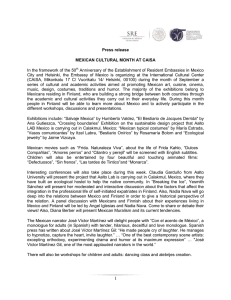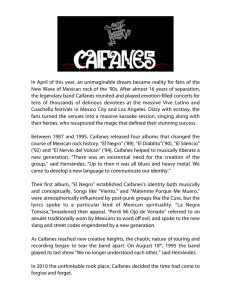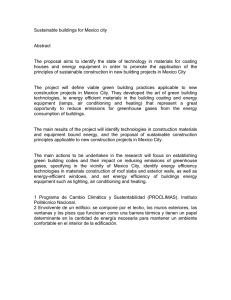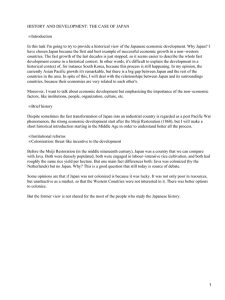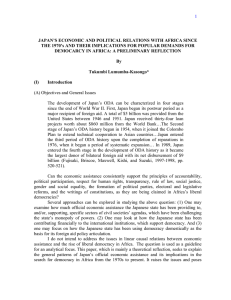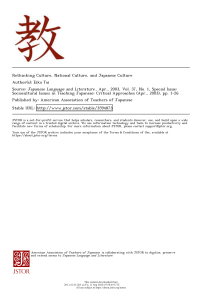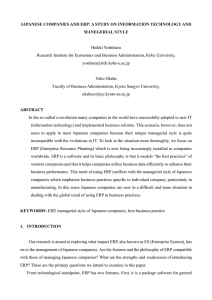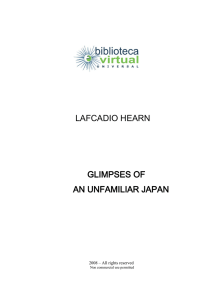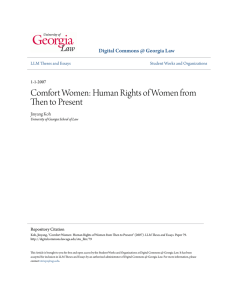Report of the Findings (Draft)
Anuncio
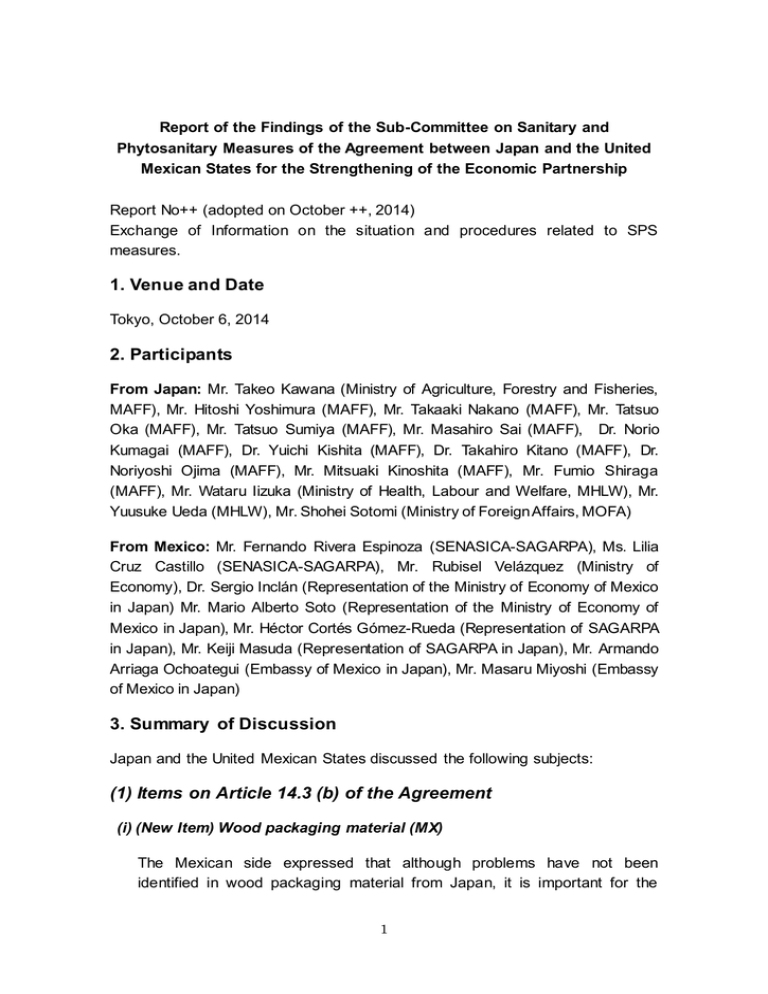
Report of the Findings of the Sub-Committee on Sanitary and Phytosanitary Measures of the Agreement between Japan and the United Mexican States for the Strengthening of the Economic Partnership Report No++ (adopted on October ++, 2014) Exchange of Information on the situation and procedures related to SPS measures. 1. Venue and Date Tokyo, October 6, 2014 2. Participants From Japan: Mr. Takeo Kawana (Ministry of Agriculture, Forestry and Fisheries, MAFF), Mr. Hitoshi Yoshimura (MAFF), Mr. Takaaki Nakano (MAFF), Mr. Tatsuo Oka (MAFF), Mr. Tatsuo Sumiya (MAFF), Mr. Masahiro Sai (MAFF), Dr. Norio Kumagai (MAFF), Dr. Yuichi Kishita (MAFF), Dr. Takahiro Kitano (MAFF), Dr. Noriyoshi Ojima (MAFF), Mr. Mitsuaki Kinoshita (MAFF), Mr. Fumio Shiraga (MAFF), Mr. Wataru Iizuka (Ministry of Health, Labour and Welfare, MHLW), Mr. Yuusuke Ueda (MHLW), Mr. Shohei Sotomi (Ministry of Foreign Affairs, MOFA) From Mexico: Mr. Fernando Rivera Espinoza (SENASICA-SAGARPA), Ms. Lilia Cruz Castillo (SENASICA-SAGARPA), Mr. Rubisel Velázquez (Ministry of Economy), Dr. Sergio Inclán (Representation of the Ministry of Economy of Mexico in Japan) Mr. Mario Alberto Soto (Representation of the Ministry of Economy of Mexico in Japan), Mr. Héctor Cortés Gómez-Rueda (Representation of SAGARPA in Japan), Mr. Keiji Masuda (Representation of SAGARPA in Japan), Mr. Armando Arriaga Ochoategui (Embassy of Mexico in Japan), Mr. Masaru Miyoshi (Embassy of Mexico in Japan) 3. Summary of Discussion Japan and the United Mexican States discussed the following subjects: (1) Items on Article 14.3 (b) of the Agreement (i) (New Item) Wood packaging material (MX) The Mexican side expressed that although problems have not been identified in wood packaging material from Japan, it is important for the 1 Mexican side to highlight the importance of complying with such legislation. The Japanese side explained its export and import system of WPM being implemented according to International Standard for Phytosanitary Measures (ISPM) 15, related regulations requiring the attachment of specific mark for import and record of import inspections. It expressed its appreciation to the Mexican plant quarantine authority because all WPM had recently imported from Mexico met its import requirements. Japanese side confirmed, by request of Mexican side, that the Japanese authorities have not identified cases of non-compliance. (ii) (New Item) Imports of Bonsai trees (MX) The Mexican side expressed that it recently has received requests to import Bonsai trees from Japan (Pinus parviflora and Acer palmatum species) and therefore to know Japanese export system legislation for those products because the Mexican side has concerns about the high risk of citrus longhorn beetles. The Japanese side shared with Mexico its experience dealing with this concern and expressed it will provide Mexico the relevant information for the export system to other countries. (iii) (New Item) Exports of unprocessed wood to Japan (MX) Considering that exports of unprocessed wood to Japan, in recent years there has been a significant increase of Mexican exports of forest products (round wood, baulks of tropical species) to different countries in Asia, including Japan. For Mexico it is important to know the phytosanitary regulations that Japan is applying to those types of products. Japanese side explained that round wood was subject of import plant quarantine and required a phytosanitary certificate but did not required exporting countries to disinfestation treatment before the export. The Japanese side informed, requested by the Mexican side, that in 2013 there were 22 cases of exports of Mexico detected with some pests but that all of them were permitted to enter Japan after taking necessary disinfestation. On request by the Mexican side, the Japanese side agreed to provide Mexican side information on the list of the companies with detected 2 pests and to establish contact points to facilitate communication between both countries. (2) Items on Article 14.3 (c) of the Agreement (i) Recognition of whole territories of Mexico as a free country of Classical Swine Fever (MX) The Mexican side emphasized the importance of this matter, and requested the Japanese side to recognize its whole territories as a country free from Classical Swine Fever (CSF) and, for that purpose, suggested to hold an expert conference or video-conference as soon as it would provide Japan with the additional information. The Mexican side will provide the information by the end of October aiming to solve this matter during November. The Japanese side explained that it had been conducting risk assessments based on the information provided by Mexico in February and July. It stated that once the Mexican side responds to the questions sent in September, it would advance its procedures progressively. The Japanese side expressed its expectation of positive results of the assessment. (ii) Requirements for export of liquid heat-treated egg products to Japan (MX) Highlighting the importance of this matter, the Mexican side requested the on-site inspection of the liquid heat-treated egg products processing facilities. The Japanese side explained that they had received the related documents on three liquid heat-treated egg products processing facilities in June, 2014 and had already requested the Mexican side to submit the additional information. The Japanese side will arrange the schedule of the on-site inspection once it receives the additional information. Both sides agreed to solve this matter as soon as possible. (iii) Fresh mango export from Chiapas State to Japan (MX) The Mexican side reiterated that Mexico is free of Ceratitis capitata including the State of Chiapas. 3 Highlighting the importance of the matter and length of the procedures, the Mexican side expressed its concerns on the request by the Japanese side of additional information, even after delivering a scientific document which certified the effectiveness of hot water treatment on fresh mango against C.capitata, in the academic Journal of Economic Entomology “Hot-Water Phytosanitary Treatment against C. capitata, (Diptera: Tephritidae) in Ataulfo Mangoes” The Japanese side stated that it needed more detailed information for disinfestation test (such as rare data). It requested to Mexico to examine the Japanese request at first and agreed to hold a face to face meeting or video conferences, if necessary. The Mexican side agreed to review the comments submitted by the Japanese side and will provide the additional information. (iv) Plan of the test or survey required for exports of bell peppers to Japan (MX) The Mexican side stated it would like to clarify the progress of Japanese procedures to recognise the test plan proposed by Mexico as appropriate to certify that bell peppers are not susceptible to tobacco blue mold (TBM). The Japanese side responded that it considered the test plan as appropriate in general but it would send some comments on the test protocol in around October. (v) Tequila (MX) The Mexican side reiterated its interest to continue the dialogue on the approval of the methanol level established in the Japanese regulations with the provisions of the Mexican regulation that regulates the production of tequila in Mexico. The Japanese side responded that discussions relating to regulations should be carried out at practitioner level and it wanted to exchange information through the Embassy of Mexico in Japan and between the competent authorities 4 The Mexican side considered that the SPS Sub-committee is the most suitable forum to discuss this matter, within the framework of the Economic Partnership Agreement. Both sides agreed to continue to discuss this matter on the SPS Sub-committee aiming to find a positive solution. Both sides agreed to explore options to continue the dialogue. (3) Others The Mexican side expressed its appreciation for the cooperation with the Japanese authorities (National Tax Agency) on the issue of adulterated tequila, and asked to continue such cooperation. Additionally, the Mexican side suggested to follow up these efforts to raise awareness among the Japanese consumers about the authenticity of the Mexican Tequila by evaluating the possibility to organize another seminar during FOODEX 2015. The Japanese side responded that it would convey the message to relevant authorities. 5
